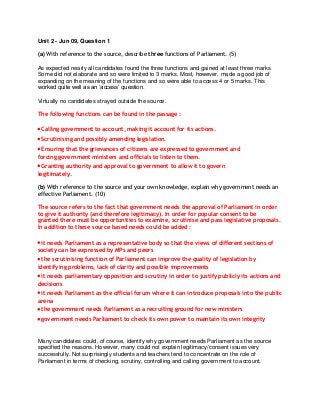
Jun 09 question, answer & report
- 1. Unit 2 - Jun 09, Question 1 (a) With reference to the source, describe three functions of Parliament. (5) As expected nearly all candidates found the three functions and gained at least three marks. Some did not elaborate and so were limited to 3 marks. Most, however, made a good job of expanding on the meaning of the functions and so were able to access 4 or 5 marks. This worked quite well as an ‘access’ question. Virtually no candidates strayed outside the source. The following functions can be found in the passage : • Calling government to account, making it account for its actions. • Scrutinising and possibly amending legislation. • Ensuring that the grievances of citizens are expressed to government and forcing government ministers and officials to listen to them. • Granting authority and approval to government to allow it to govern legitimately. (b) With reference to the source and your own knowledge, explain why government needs an effective Parliament. (10) The source refers to the fact that government needs the approval of Parliament in order to give it authority (and therefore legitimacy). In order for popular consent to be granted there must be opportunities to examine, scrutinise and pass legislative proposals. In addition to these source based needs could be added : • it needs Parliament as a representative body so that the views of different sections of society can be expressed by MPs and peers • the scrutinising function of Parliament can improve the quality of legislation by identifying problems, lack of clarity and possible improvements • it needs parliamentary opposition and scrutiny in order to justify publicly its actions and decisions • it needs Parliament as the official forum where it can introduce proposals into the public arena • the government needs Parliament as a recruiting ground for new ministers • government needs Parliament to check its own power to maintain its own integrity Many candidates could, of course, identify why government needs Parliament as the source specified the reasons. However, many could not explain legitimacy/consent issues very successfully. Not surprisingly students and teachers tend to concentrate on the role of Parliament in terms of checking, scrutiny, controlling and calling government to account.
- 2. However, Parliament, especially the Commons also supports government by providing consent and legitimacy. Interestingly a good number said that calling government to account and scrutinising legislation were roles which Government itself needed. The best responses explained that this is something government needs because it potentially improves the quality of legislation and governance generally. A few candidates referred to Parliament’s role as a recruiting and training ground for ministers. A few good candidates also discussed the Lords’ key role in improving legislation. For the future, it would be useful for candidates to be fully aware that Parliament supports Government as well as checking it. (c) Analyse the main factors that limit the effectiveness of Parliament. (25) There was good coverage of some key issues – excessive party loyalty, power of patronage and the whips, size of government majorities etc. However too many did not explain or develop these points well enough and so scored on AO1 rather than AO2. Better candidates discussed more sophisticated issues such as lack of time and expertise, government control of business, weaknesses of both kinds of committees. In general the committee work of Parliament seems to be something of a weakness. A common, positive theme was that Parliament could not successfully represent as it was not itself representative, politically or socially. Surprisingly little reference was made to the current expenses row – this could have been made relevant. It was mainly weaker candidates who, by design or accident, picked up marks by pointing out the limitations of the Lords. Typically such candidates were often weak on the Commons, perhaps because the limitations of the Commons are more subtle. Only a few, however, referred to the lack of legitimacy of either house. This was an analytical rather than evaluative question, so those who decided to treat it simply as an evaluation of Parliament’s roles failed to pick up many AO2 marks. The following factors limit the effectiveness of Parliament: • The discipline exercised by the whips and party leaders prevents MPs and peers operating independently (the ‘lobby fodder’ issue). Divisions and standing committees are usually strictly whipped. • MPs and peers do not have sufficient time, expertise, knowledge and research back-up to be able effectively to examine legislation and government policy. • The Commons may be said to lack legitimacy because of its distorted representation (the electoral system), while the Lords is unelected. • Collective responsibility, the anonymity of officials and traditional secrecy of government make it difficult for MPs, peers and select committees to obtain information and examine policy effectively.